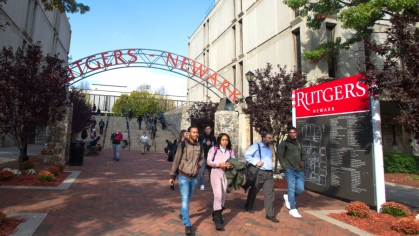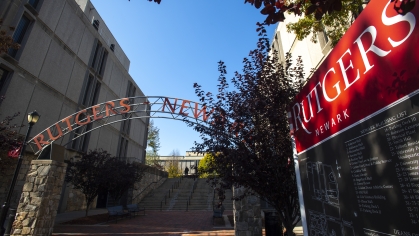Charles Payne of the Cornwall Center at Rutgers-Newark Named to American Academy of Arts and Sciences
Pioneering sociologist Charles Payne, director of the Cornwall Center for Metropolitan Studies at Rutgers-Newark, was named this year to the American Academy of Arts and Sciences.
Payne’s research has broken new ground in the study of both the civil rights movement and urban education.
Within the past three years, the Cornwall Center has produced several reports on urban education in New Jersey, with a focus on the effects of segregation, resource disparities, and creating stronger pathways to adulthood for children from underserved communities. The center’ work has begun to affect policy at state and local levels.
An ongoing theme in the center’s research, nationally and in New Jersey, is trying to identify and help replicate the success of schools that have done the best work in educating the most vulnerable children.
“Much of the research focuses on failure. We spend a lot of time looking for positive outliers. Where do we find the places students thrive?” said Payne, a Henry Rutgers Distinguished Professor of African American Studies.
“We’re looking at things schools can do with real-world constraints, with the resources and personnel they actually have,’’ said Payne.
The academy announced its Class of 2025 on April 23 – a group of nearly 250 inductees who have distinguished themselves in academia, the arts, industry, policy, research, and science.
This year’s class includes CNN news anchor Anderson Cooper; actor, producer, and humanitarian Danny Glover; activist and journalist Gloria Steinem and novelist Amy Tan.
The academy, one of the nation’s most prestigious honor societies, was created during the American Revolution in 1780 and its early members included Benjamin Franklin and Alexander Hamilton. Since then, there have been more than 15,000 members inducted including former Supreme Court Justice Antonin Scalia (2003), musician John Legend (2017) and author Salman Rushdie (2022).
Payne changed how the story of the civil rights movement is told. He is best-known work is the award-winning I’ve Got the Light of Freedom: The Organizing Tradition and the Mississippi Freedom Struggle, published in 1995. It documents how grassroots activists in Mississippi built, in the face of violence and repression, a movement that changed the country.
Previously, historians were more focused on leaders like Martin Luther King Jr. and the role of the Black church.
“What that book did was try to tell the story of the Mississippi movement through the eyes of Mississippians,’’ said Payne. “Before that, scholarship was overwhelmingly written from the top-down perspective.”
I’ve Got the Light of Freedom was pivotal in influencing research on the Civil Rights struggle and it continues to be used as a framework for present-day activists.
As part of his work, Payne studied the Freedom Schools for Black Mississippians, which were established in 1964 and become a model for activist education, stressing the development of agency and dignity in students and grounding them in the history of social struggle. The schools, which took root in other cities and states, provided an alternative education that addressed systemic inequalities and included lessons on African and African American culture.
Since arriving at Rutgers-Newark in 2017, Payne helped lead an effort by the Cornwall Center and the Office of University- Community Partnerships to establish Freedom School programs in the Greater Newark area and statewide in partnership with the Children's Defense Fund. There are now 14 such schools in New Jersey.
The premise of Freedom School is that freedom starts from within.
“Nobody can lead anyone to freedom. You have to free yourself. It’s about human growth, not just policies,’’ said Payne. “If people can’t understand their freedoms, they can’t defend their freedoms.’’
Payne’s induction into the American Academy of Arts and Sciences signifies that his work has resonated within and beyond academia, he observed.
“It’s deeply gratifying. Scholars often have no idea if anybody is reading their work, let alone thinking about it,’’ he said. “I take this to be some indication that people find the work useful. And that’s just gratifying.’’


